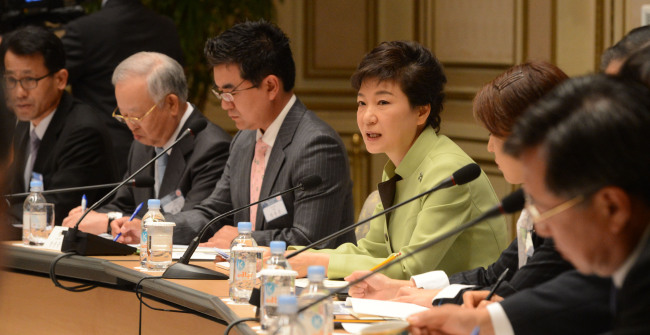The government unveiled Wednesday a set of deregulatory measures aimed at boosting corporate and foreign investment to offset weak facility investment and construction activities as part of its efforts to overcome low domestic growth and boost business confidence.
The Ministry of Finance said Wednesday that it would move to cut red tape and make its regulatory systems efficient so that domestic and foreign-invested companies can speed up their investment projects in the country. Such deregulatory measures are expected for Korea to gain some 12 trillion won ($10.9 billion) in investments, a Finance Ministry official noted.
While presiding over an investment-and export-related meeting, President Park Geun-hye emphasized the need to root out unnecessary regulations that are hindering businesses and investments for the development of a “creative economy.”
She urged government officials to go out to the field and listen to what both domestic and foreign investors want instead of sitting behind their desk reviewing only regulatory and policy data.
“We must eliminate regulations that block (business and technology) convergence to boost the development of a creative economy,” the president said.
 |
President Park Geun-hye speaks at the first meeting promoting trade and investment at Cheong Wa Dae on Wednesday. (Chung Hee-cho/The Korea Herald) |
“We have entered an era where there are limits for companies to expand in their traditional markets. Thus, deregulation is inevitable for growth in exports and jobs,” she added.
To this end, the government will move to relax regulatory measures and speed up the business license procedures for companies and investors’ projects.
It will also help them, including joint venture firms with foreign investors, easily tap and access land sites in regional industrial zones where they can establish plants.
Antitrust regulations governing equity ties between subsidiaries of group holding companies and other units will be eased, paving the way for subsidiaries’ units to form joint ventures, or the so-called “great-grandson companies,” with foreign business partners with high-tech assets.
Under the current fair trade law, subsidiaries's units of holding companies are required to wholly own, or hold a 100 percent stake in, great-grandson companies.
The government will move to lower the equity ownership cap from 100 percent to 50 percent so that those companies removed from restrictions can attract foreign investors and operate a joint venture partnership, the Finance Ministry said.
This may, for instance, push SK Global Chemical, wholly owned by SK Innovation of SK Group, to establish joint venture operations with Japan-based JX Nippon Oil & Energy in para-xylene chemical.
Korean hospitals will soon be allowed to build their own set of hotels exclusively for foreign patients in line with efforts to boost medical tourism.
Foreign investors from the U.S. and Europe will also be allowed to indirectly invest, for instance through funds, in communication carriers for a 100 percent stake, from currently up to 49 percent. Dominant players such as SK Telecom and KT will remain restricted from foreign investors holding more than a 49 percent stake.
President Park furthermore urged her policymakers to increase support funding Korea’s small and medium enterprises for facility upgrades from 3 trillion won to 5 trillion won, while considering softening inheritance tax regulations on SMEs.
SMEs will also benefit from the government’s 11 trillion won fund to support their export financing as a means to counter foreign exchange volatility amid a weakening yen.
By Park Hyong-ki (hkp@heraldcorp.com)








